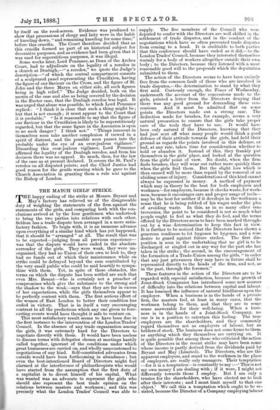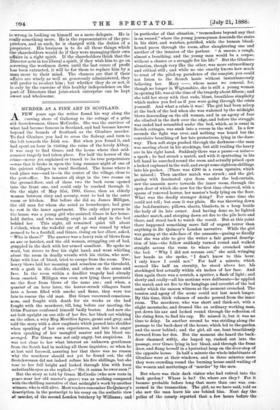111E MATCH GIRLS' STRTITE.
THE happyending of the strike at Messrs. Bryant and May's factory has relieved us of the disagreeable duty of weighing the statements of the firm against the statements of the girls, and comparing both with the con- clusions arrived at by the four gentlemen who undertook to bring the two parties into relations with each other. Seldom has a trade dispute been arranged in a more satis- factory fashion. To begin with, it is an immense advance upon everything of a similar kind which has yet happened, that it should be " arranged " at all. The result that was to be expected—judging from all previous experience— was that the dispute would have ended in the absolute surrender of the girls. They were weak, they were un- organised, they had no Union of their own to look to, they had no funds out of which their maintenance while on strike could be defrayed beyond the sum contributed by the very small public who could be said heartily to sympa- thise with them. Yet, in spite of these obstacles, the terms on which the dispute has been settled are such that even Mrs. Besant—who is certainly not a preacher of compromises which give the substance to the strong and the shadow to the weak—says that they are far in excess of her expectations, while the girls themselves appear to be perfectly content with them. The first serious effort of the women of • East London to better their condition has ended in victory. That is in itself a very encouraging contrast to all the predictions which any one given to fore- casting events would have thought it safe to venture on. This most satisfactory result seems to have been due in the first instance to the intervention of the London Trades' Council. In the absence of any trade organisation among the girls, it was extremely hard for the Directors to negotiate directly with them. It would have been useless to discuss terms with delegates chosen at meetings hastily called together, ignorant of the conditions under which great businesses are carried on, and wholly unaccustomed to negotiations of any kind. Self-constituted advocates from outside would have been forthcoming in abundance ; but even the best-intentioned Board of Directors might feel alarmed at the interference of philanthropists who would have started from the assumption that the first duty of a capitalist is to divest himself of his capital. What was wanted was an advocate to represent the girls who should also represent the best trade opinion on the relations between masters and workmen ; and this was precisely what the London Trades' Council was able to supply. The five members of the Council who were deputed to confer with the Directors are well skilled in the settlement of trade disputes, and in the conduct of the negotiations which have so often prevented trade disputes from coming to a head. It is creditable to both parties that this conference should have ended as it did,—to the London Trades' Council, because they interested themselves warmly for a body of workers altogether outside their own body ; to the Directors, because they listened with a most reasonable good will to the proposals which the deputation submitted to them.
The action of the Directors seems to have been entirely free from the common fault of those who are involved in trade disputes,—the determination to stand by what they first said. Curiously enough, the Times of Wednesday,. underneath the account of the concessions made to the girls, printed a letter from the Directors denying that there was any good ground. for demanding these con- cessions. And it must be admitted that on some points the Directors made out a strong case. The deduction made for brushes, for example, seems a very natural precaution to ensure that the girls take proper care of the tools they have to use. It would have been only natural if the Directors, knowing that they had just sent off what many people would think a good defence of their attitude towards the girls, had held their ground as regards the points involved in this defence, or- had, at any rate, taken time for consideration whether to hold or abandon it. Instead of this, they frankly put themselves in the girls' place, and looked at the question from the girls' point of view. No doubt, when the firm finds brushes, they will wear out rather more quickly than when the girls find them. But the slight loss which is thus caused will be more than repaid by the removal of an abiding sense of injury. Considerations of this kind cannot always be expressed in money. A method of payment which may in theory be the best for both employers and workmen—for employers, because it checks waste, for work- men, because it encourages care and proper usage of tools— may be the best for neither if it develops in the workman a sense that he is being robbed of his wages under the plea of avoiding waste. In this, as in so many other con- troversies, the point to be considered is not so much what people ought to feel as what they do feel, and the terms offered by the Directors seem to have been marked through- out by a wise determination to keep this fact in view. It is further to be noticed that the Directors have shown a generous readiness to let bygones be bygones, and a wise desire to guard against future strikes. The first dis- position is seen in the undertaking that no girl is to be discharged. or singled out in any way for the part she has taken. in the strike ; the second, in the encouragement of the formation of a Trade-Union among the girls, " in order that any just grievances they may have in future shall be represented directly to the heads of the firm, and not, as in the past, through the foremen."
These features in the action of the Directors are to be regarded with especial satisfaction, because the growth of Joint-Stock Companies has introduced some new sources of difficulty into the relations between capital and labour.. It has lessened the influence of natural kindliness upon the employer. When a business is in the hands of a private firm, the masters feel, at least in many cases, that the workmen belong to them, and that they are in some sense answerable for their well-being. When a busi- ness is in the hands of a Joint-Stock Company, no one is in a position to entertain this feeling. The true- employers are the shareholders, and they commonly regard themselves not as employers of labour, but as holders of stock. The business does not come home to them as anything which they themselves are carrying on. It is quite possible that among those who criticised the action • of the Directors in the recent strike may have been some whose income is partly derived from the dividends paid by Bryant and May (Limited). The Directors, who are the apparent employers, and stand to the workmen in the place of employers, are really only managers. Their temptation —for it is a temptation—is constantly to say This is not my own money I am dealing with • if it were, I might act differently towards those I employ. But I am only a trustee for the shareholders, who have elected me to look after their interests; I must limit myself to that one object.' We call tis a temptation which ought to be re- sisted, because the Director of a Company employing labour is wrong in looking on himself as a mere delegate. He is really something more. He is the representative of the pro- prietors, and as such, he is charged with the duties of a proprietor. His business is to do all those things which the shareholders would do if they were managing their own affairs in a right spirit. If the shareholders think that the Director acts in too liberal a spirit, if they wish him to go on screwing the workmen down until the last ounce of profit has been extracted, it will be for them to replace him by a man more to their mind. The chances are that if their affairs are wisely as well as generously administered, they will prefer to re-elect him ; but whether they do or not, it is_only by the exercise of this healthy independence on the past of Directors that joint-stock enterprise can be kept sweet and wholesome.



































 Previous page
Previous page